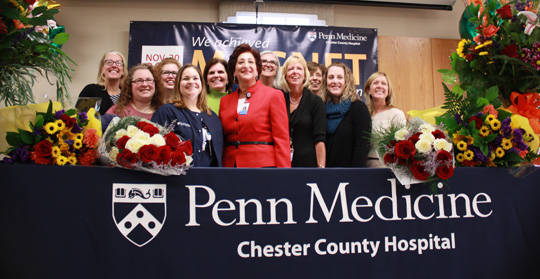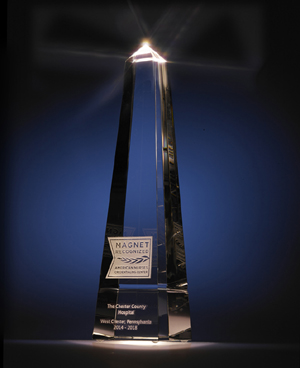 MAGNET WRITERS and LEADERSHIP (pictured from left): Kim Derr, RN ; Nikki DiFabrizio, BSN, RN, PCCN; Heather Donohue, BSN, RN, CNOR; Lindsay Pritchett, BSN, RN, CMSRN; Marianne Casale, MSN, RN, CHPN, CS, AOCN; Angela Coladonato, MSN, RN, NEA-BC; Margaret Kramaric, BSN, RN, CCRN, CSC; Patty Paulley, BSN, RN, CEN; Rebecca Mountain, MSN, RN, CEN, CPEN; Melissa Cargan-Bodnar, BSN, RN, CMSRN and Donna Taylor, BSN, RN, CCRN. [Not pictured: Tonya Beattie, BSN, RN, CCRN; Claire Fisk, BSN, RN, CCE; and Jaime O'Donnell, MSN, RN, CCRN.]
MAGNET WRITERS and LEADERSHIP (pictured from left): Kim Derr, RN ; Nikki DiFabrizio, BSN, RN, PCCN; Heather Donohue, BSN, RN, CNOR; Lindsay Pritchett, BSN, RN, CMSRN; Marianne Casale, MSN, RN, CHPN, CS, AOCN; Angela Coladonato, MSN, RN, NEA-BC; Margaret Kramaric, BSN, RN, CCRN, CSC; Patty Paulley, BSN, RN, CEN; Rebecca Mountain, MSN, RN, CEN, CPEN; Melissa Cargan-Bodnar, BSN, RN, CMSRN and Donna Taylor, BSN, RN, CCRN. [Not pictured: Tonya Beattie, BSN, RN, CCRN; Claire Fisk, BSN, RN, CCE; and Jaime O'Donnell, MSN, RN, CCRN.]
Published: Synapse 2015, Vol. 1
 Only seven percent of U.S. hospitals have it. Fewer than 25 hospitals in the state of Pennsylvania have it.
Only seven percent of U.S. hospitals have it. Fewer than 25 hospitals in the state of Pennsylvania have it.
"It" is Magnet® recognition from the American Nurses Credentialing Center (ANCC ), widely regarded as the highest mark of excellence a hospital can receive for nursing quality. Some even refer to it as the "Nobel Prize of nursing." The term Magnet was coined 20 years ago to recognize hospitals for specific strengths that attract and retain the best nurses. Since then, numerous studies have shown that Magnet hospitals have better patient outcomes, higher quality, and greater satisfaction among patients and nurses alike.
On November 20, 2014, Chester County Hospital officially joined this select group of Magnet hospitals, which already includes two of its Penn Medicine partners: the Hospital of the University of Pennsylvania and Penn Presbyterian Medical Center. Pennsylvania Hospital is currently on its Journey to Magnet Excellence®.
Chester County Hospital's Chief Nursing Officer Angela Coladonato, MSN, RN, NEA-BC, received the momentous news during a conference call with Deborah Zimmermann, DNP, RN, NEA-BCFAAN, chairperson of the ANCC 's Commission on Magnet. Coladonato, CEO Michael J. Duncan, COO Michael Barber, and Magnet Project Director Patty Paulley BSN, RN, CEN, plus nearly 150 hospital leaders, physicians, staff members, and most importantly nurses, listened to the call and cheered with excitement when they heard the announcement.
"The Magnet appraisers and the Commission are just as thrilled as you are about this news," Dr. Zimmermann said. "Your appraisers said that you have a culture that should be bottled and sold to others! You are truly extraordinary." The ANCC Magnet appraisers reviewed the hospital's 3,000-page application -- yes, 3,000 pages -- and spent three days here in September touring the units, speaking with nurses and other staff, and interviewing patients and community members.
Zimmermann pointed to a number of strengths that made Chester County Hospital nurses stand out, ranging from their innovative teamwork to prevent falls and shorten Emergency Department wait times, to community events such as the "Man Down flash mob" in West Chester to simulate a CPR emergency, to the constant visibility and accessibility of CNO Angela Coladonato. The day represented the culmination of a journey that Coladonato initiated when she became chief nursing officer in 2006.
"One of my goals when I first started here eight years ago was for our nurses and the hospital to achieve Magnet recognition," Coladonato said. "We took the time to put the building blocks in place to get to this point, and now we can say we have demonstrated superior excellence in nursing. When you are a patient in a Magnet hospital, you're in a place with a proven commitment to improving quality, safety, and patient satisfaction, and never accepting the status quo."
"Showing" and not just telling was the central challenge of the Magnet process. Pursuing the recognition was voluntary, but the hospital had to give the ANCC reams of hard evidence that the nurses are indeed exceptional. The hospital had to show consistent above-benchmark performance in the National Database of Nursing Quality Indicators (NDNQI), which includes nurse-sensitive indicators such as pressure ulcers, falls, and hospital-acquired infections. The writers had to supply nearly 120 detailed stories, all backed up by what the ANCC calls "sources of evidence" -- meeting minutes, posters, photographs, videos, outcomes data, news stories, hospital newsletters and publications, you name it -- to demonstrate nurses' excellence. Areas of focus included leadership and professionalism; empowerment to provide the best nursing care in any situation; commitment to education and new knowledge; and the ability to improve care for better patient outcomes, were all critiqued.
It was a tall order, and one daunting enough to dissuade many hospitals from pursuing Magnet recognition.
Patty Paulley, BSN, RN, CEN, Director, Nursing Quality/Professional Practice/Magnet Project, who led the process for Chester County Hospital, credited its success to a rather unusual decision to have most of the writing and assembling of evidence completed by 12 front-line staff nurses, instead of nursing administrators or executives.
"If this document was going to be about how great our staff nurses are, we felt that they should be the ones preparing it," she said. "We wanted to tell their story, and not a story from the management level. Starting in May of 2013, we gathered in a computer room to write once a week for eight hours. This was a major commitment by the hospital, since the nurses were off the floor during that time, but I feel the leadership here truly believed we were worthy of Magnet and just had to demonstrate it to the public and to our Magnet appraisers."
For nearly a year, the writers came together to bounce ideas off one another, find the best stories to tell from across all together to bounce ideas off one another, find the best stories to tell from across all nursing units, and track down the evidence to support each story -- which often involved going beyond nursing to consult other departments. It was rough going at first, with some of the initial drafts getting thrown out for lack of compelling evidence. But eventually the nurses settled into a groove, and put all their effort into showcasing the best examples and perfecting their respective sections of the document.
They also found no shortage of great stories to tell. For instance, nurses in the Cardiac Catheterization Lab had created an educational video to help patients prepare for catheterization and peripheral angiography procedures. Surgical Care Unit nurses designed and sewed "pretty pockets" for mastectomy patients to secure cumbersome surgical drains inside their garments, without the need for taping. Another nurse introduced the use of a new type of port protector that significantly reduced the rate of central-line infections at the hospital. Another nurse volunteered her time to give free flu shots to mushroom farm workers in Southern Chester County. These are just several out of hundreds of stories, some running as long as 20 or 30 pages, that made it into the Magnet document, but they demonstrate what ANCC was looking for: proof that Chester County Hospital's nurses consistently go above and beyond expectations.
"Nurses here tend to be humble about their accomplishments and think, 'Well, it's all in a day's work,'" said Paulley. "Through this process of Magnet recognition, they have realized that they do much more than just care for patients. They advocate for patients, consistently work for their best interests, and get them involved in their own care. Nursing is on the front lines 24/7 and plays a huge role in the hospital experience, and I believe that is what we were able to highlight in our document."
Melissa Cargan-Bodnar, BSN, RN, CMSRN, charge nurse for the surgical unit on Lasko Tower 3, is a 20-year veteran of Chester County Hospital who participated in almost every aspect of the Magnet process -- attending the first meetings, serving on nursing councils, and eventually becoming a "Magnet Ambassador" to rally her fellow nurses around the cause. Cargan-Bodnar served on the writing team and escorted the Magnet appraisers during their September visit. Despite the hard work involved, she said that she gained more than she gave -- even when she found herself getting up at 4 a.m. to assemble yet another Magnet story.
"Being part of this has been one of the highlights of my career," Cargan- Bodnar said. "I grew closer to my nursing colleagues. I gained a better sense for all of the great things that go on at the hospital as I got outside of my own unit and worked with other departments.
"I also believe that this process -- and our success -- have transformed the entire Department of Nursing," she added. "Angela [Coladonato] started us on this journey and made us feel like we could do anything. Every time she talked about Magnet and nursing quality, she drew us in and made us want to do more. We really learned to take ownership of the nursing profession. I am back in school now for my Master's in Nursing, and many of my colleagues are pursuing additional education or certifications in their specialty." In doing so, they are following the example set by Coladonato, who is pursuing her Doctor of Nursing Practice at Thomas Jefferson University.
And that's another thing about Magnet recognition: Once you have it, you must keep showing your commitment to continuous improvement in nursing -- more education, more certifications, better patient outcomes, demonstrated leadership in the hospital and the profession, more participation in research on best nursing practices. In two years, the hospital will send a progress update to ANCC and then pursue Magnet re-designation in four years, as is required for all Magnet organizations. That's the beauty -- and the challenge -- of Magnet, said Coladonato, and also why she views it not just as a nursing recognition, but as a hospital recognition.
"When your numbers are good and things are going well, it's easy to get complacent, but Magnet pushes you to show that you're always working to become even better," she said. "Even though it's talked about as the highest award you can get in nursing, it truly is a hospital achievement. If you have the entire hospital behind the nursing team, you can get it done. It is really about the whole team."
So as Chester County Hospital takes time to celebrate this Magnet milestone, we know that the journey will continue.
By Kristine M. Conner
The Magnet Recognition Program®, Magnet® and Journey to Magnet Excellence® names and logos are registered trademarks of the American Nurses Credentialing Center.
All rights reserved.